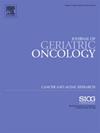A pragmatic randomized controlled trial of nurse-delivered brief Meaning Centered Psychotherapy at Home (MCP-H) for individuals with advanced cancer: Study protocol
IF 2.7
3区 医学
Q3 GERIATRICS & GERONTOLOGY
引用次数: 0
Abstract
Introduction
Patients with advanced cancer are often confronted with existential distress that, when unaddressed, may lead to increased suffering and despair. Homebound individuals face compounded existential concerns and loss of meaning, as they must contend with loss of independence and declining opportunities for activities and social engagement. Thus, there is a need to develop strategies for delivering quality psychological interventions to homebound patients. In the United States, homecare agencies provide care to over 4.5 million patients annually, with nurses comprising over half of their employees. Given the size of this workforce and their frequent contact with homebound patients, we developed Meaning Centered Psychotherapy at Home (MCP-H) to be delivered by nurses to increase the reach of this evidence-based intervention to this population.
Materials and Methods
In Phase 1, nurse participants (n = 8–10) from VNS Health will be trained to deliver MCP-H. We will enroll 8–10 training case patients, each paired with one nurse interventionist, in a single-arm open pilot study to refine the intervention structure and procedures. In Phase 2, we will conduct a pilot randomized controlled trial to determine the feasibility, acceptability, and preliminary efficacy of MCP-H. Patients (n = 70) will be randomized to receive either MCP-H or treatment as usual.
Discussion
MCP-H has unique potential to increase the reach of mental health care to individuals receiving homecare, leveraging the existing infrastructure of a high-volume home health agency and nurses to address the unmet needs of these patients. If effective, it can be embedded in existing systems as a potentially widely disseminable approach to reaching historically underserved patient populations.
Trial Registration.
This study is registered under ClinicalTrials.gov (ID NCT05495737).
一项实用的随机对照试验,护士提供简短的以意义为中心的家庭心理治疗(MCP-H)对晚期癌症患者:研究方案
晚期癌症患者经常面临生存压力,如果不加以解决,可能会导致更多的痛苦和绝望。在家的人面临着复杂的生存问题和生活意义的丧失,因为他们必须与丧失独立性、减少活动和社会参与的机会作斗争。因此,有必要制定策略,为居家患者提供高质量的心理干预。在美国,家庭护理机构每年为450多万患者提供护理,护士占其员工总数的一半以上。考虑到这一群体的规模以及他们与居家患者的频繁接触,我们开发了由护士提供的以意义为中心的家庭心理治疗(MCP-H),以增加这种循证干预对这一人群的影响。材料和方法在第一阶段,来自VNS Health的护士参与者(n = 8-10)将接受提供MCP-H的培训。我们将招募8-10名培训病例患者,每名患者与一名干预护士配对,进行单臂开放试点研究,以完善干预结构和程序。在第二阶段,我们将进行一项随机对照试验,以确定MCP-H的可行性、可接受性和初步疗效。患者(n = 70)将随机接受MCP-H或常规治疗。mcp - h具有独特的潜力,可以增加接受家庭护理的个人的精神卫生保健范围,利用现有的大量家庭卫生机构和护士的基础设施来解决这些患者未满足的需求。如果有效,它可以作为一种潜在的广泛传播方法嵌入现有系统,以覆盖历史上服务不足的患者群体。试验注册。本研究在ClinicalTrials.gov注册(ID NCT05495737)。
本文章由计算机程序翻译,如有差异,请以英文原文为准。
求助全文
约1分钟内获得全文
求助全文
来源期刊

Journal of geriatric oncology
ONCOLOGY-GERIATRICS & GERONTOLOGY
CiteScore
5.30
自引率
10.00%
发文量
379
审稿时长
80 days
期刊介绍:
The Journal of Geriatric Oncology is an international, multidisciplinary journal which is focused on advancing research in the treatment and survivorship issues of older adults with cancer, as well as literature relevant to education and policy development in geriatric oncology.
The journal welcomes the submission of manuscripts in the following categories:
• Original research articles
• Review articles
• Clinical trials
• Education and training articles
• Short communications
• Perspectives
• Meeting reports
• Letters to the Editor.
 求助内容:
求助内容: 应助结果提醒方式:
应助结果提醒方式:


